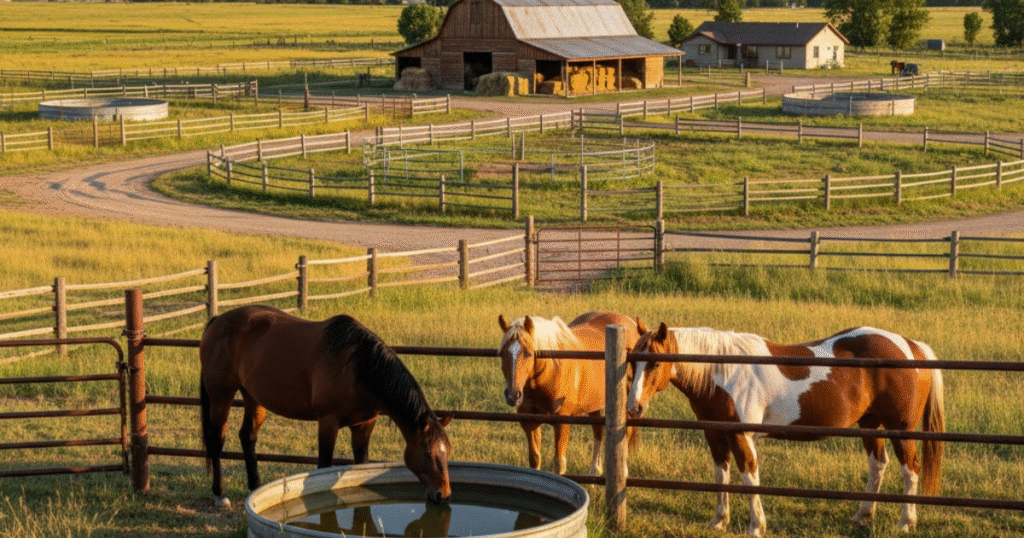
Types of Horse Properties in Colorado
“Colorado horse property” isn’t one-size-fits-all. For one buyer it’s a 5-acre place 20 minutes from Denver; for another it’s a 100-acre working ranch in Elbert County. Facilities, acreage, lifestyle—and most importantly the legalities—can be completely different. Understanding the three main types is the best first step in your search.
🐎 Quick Summary: Which Property Type is for You?
- Equestrian Estates: 10–40 acre luxury, all-inclusive properties with high-end barns (often heated), indoor arenas, custom homes, and premium amenities. Turnkey solutions for discerning buyers or professionals, often in areas like Parker, Sedalia, or Boulder County.
- Ranches & 35+ Acre Parcels: Defined by the land. With 35+ acres they’re ideal for hay production, larger training/breeding operations, or ultimate privacy—often the clearest path to Ag tax status and robust well permits.
- Hobby Farms: Most popular, typically 5–15 acres, perfect for 2–4 personal horses with a reasonable commute and suburban access.
- The key difference: Type is set by acreage, legal water rights, and county zoning, which together determine use, cost, and long-term value.
Equestrian Estates
Who it’s for
The discerning luxury buyer, the dedicated professional trainer, or the high-performance amateur who needs world-class facilities.
What it is
Amenities define this property. Expect a turnkey experience with a custom luxury home and horse facilities of the same quality—heated barns with 12×12 stalls, automatic waterers, hot-water wash bays, a premium-footing indoor arena, and often separate guest or trainer quarters.
- Typical Acreage: 10–40 acres
- Key Features: Custom home, top-tier barn (6+ stalls), indoor/outdoor arenas, horse-safe fencing, landscaped grounds
- Where to Look: Parker, Sedalia, Cherry Hills Village, Boulder, Longmont
Bottom line: A luxury, move-in-ready equestrian lifestyle. Hurdles include premium price points and potentially restrictive HOA covenants.
Working Ranches & 35+ Acre Parcels
Who it’s for
Serious equestrians, breeding or training businesses, hay producers, or buyers who want privacy and self-sufficiency.
What it is
Defined by land and output. Homes range from modest to grand, but value concentrates in acreage, irrigated fields, and functional outbuildings—large hay barns, machine shops, and extensive cross-fencing.
The 35-acre threshold matters in Colorado: it often unlocks a domestic well that includes livestock and is the simplest route to Agricultural (Ag) Status for property taxes.
- Typical Acreage: 35–160+ acres
- Key Features: Large outbuildings, significant hay storage, irrigated pastures (if water rights convey), functional fencing
- Where to Look: Elbert County (Elizabeth, Kiowa, Elbert), Franktown, Weld County, parts of Larimer County
Bottom line: An investment in land and production. Due diligence centers on irrigation water rights, mineral rights, and zoning for your intended business.
Hobby Farms
Who it’s for
The most common buyer profile—usually 2–4 personal horses and a job in or near the city.
What it is
A manageable 5–15 acre property that balances equestrian life with suburban convenience. Facilities are practical for personal use: a 2–4 stall barn or loafing shed, perimeter fencing, a tack room, and trailer parking. The home is typically a standard residence.
- Typical Acreage: 5–15 acres
- Key Features: 2–4 stall barn or run-in shed, good cross-fencing, a smaller outdoor arena (or room to build one), reasonable commute
- Where to Look: Around the suburbs—Arvada, Golden, Franktown, Black Forest, Loveland, and parts of unincorporated Jefferson and Adams counties
Bottom line: The quintessential Colorado horse property. The biggest challenge is water and zoning—many parcels at this size have household-use-only wells that aren’t legal for livestock.
How Water and Zoning Define Your Property
You can’t identify property type by looks alone. A 10-acre “hobby farm” is useless for horses if the well is household-only. An “equestrian estate” in an HOA that allows only two horses isn’t a professional facility.
- Water Rights: Confirm the well permit allows livestock. For ranches, confirm irrigation or adequate supply for your intended herd or hay acreage.
- Zoning & Covenants: County zoning determines allowed uses and whether a business can operate. HOA covenants can limit horse counts and certain structures.
Find the Property Type That Fits Your Dream
Whether you want a luxury, turnkey estate, a sprawling ranch with room to grow, or a practical hobby farm close to town, the search for each is different—requiring different loans, inspections, and expertise. A specialist in land and equestrian properties looks past the house to the bones of the property—the water, the zoning, the soil—so the place you buy truly matches the life you want to live.
Frequently Asked Questions (FAQ) About Property Types
What is the most common type of horse property in Colorado?
The Hobby Farm is most common around the Denver Metro and Colorado Springs. These 5–15 acre properties offer the best balance of equestrian life and access to jobs and amenities, so demand is high.
Why is “35 acres” such a common number for ranches?
In Colorado, 35 acres is a key legal threshold. Owning 35+ acres can exempt a parcel from certain well-permitting limits, making it easier to obtain a well that allows livestock, multiple homes, and sometimes irrigation. It’s also a common minimum for Agricultural (Ag) tax status.
Can I run a horse boarding business on a hobby farm?
Usually no. Most hobby farms sit in residential or rural-residential zones that forbid commercial operations. To board horses as a business you typically need a ranch property in an area zoned for commercial agriculture, or you must obtain a special use permit.
